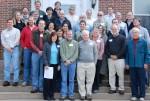A diverse group of social and ecological scientists gathered at the Harvard Forest late this March through early April to ponder potential ecological futures around Long Term Ecological Research (LTER) sites. They were participants in the "Scenarios of Future Landscape Change Workshop," which was designed to encourage prescient thinking in coupled human-natural systems where true prediction is not possible. The workshop was funded by the National Science Foundation through the LTER Network Office and participants represented 16 LTER sites and all were involved in some stage of scenario planning for the region surrounding their site.
The scenarios focused on a diverse range of potential drivers and responses: from homeowner lawn-care decisions and the impact on water quality around the Plum Island site in Massachusetts, to the changing fire regimes and their impact on moose habitat around the Bonanza Creek site in Alaska. Yet, despite the range of viewpoints, participants found plenty of common ground. For example, all sites are trying to understand how different suites of assumptions about the future would play-out along logical trajectories. In addition, they all struggle with crafting scenarios that bound the range of plausible futures. More practically, most sites expect that climate and land use change will be the dominant drivers of future landscape dynamics and are interested in scenarios describing how these drivers might affect carbon storage and water quality.
After a couple days of spirited discussion in Harvard's Fisher Museum, surrounded by dioramas depicting past landscape change, two points became clear: first, that the LTER network, with its focus on long term ecological change, is uniquely suited to this line of research, and second, that Yogi Berra was on to something when he said: "The future ain't what it used to be."
By Jonathan Thompson, HFR

 Enlarge this image
Enlarge this image
